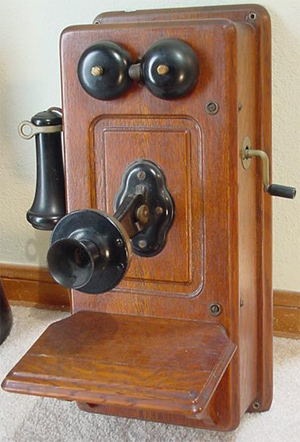I am old enough to remember when people did not have a telephone in their homes. These were folks who were not so sure about the real benefit of having their home connected to the outside world via a machine that mysteriously brought the human voice into the quiet of their kitchens, living rooms, and bedrooms.
My grandparents lived on a party line when they determined if the call was for them by the number and length of the rings the phone generated. It was not uncommon to have people listen in uninvited to the party line which was, in reality, the way a world could gain access to your most guarded words.
It did not take long and nearly everyone got a phone and the party line gave way to the rotary phone with a dial that eliminated the job for Mrs. Johnson who was central or the operator for the town. In the end we could not put off the enticing idea that we could transverse miles in a moment and speak to people far away as if they were right next to us.
It was still expensive. So when I went away to college I was cautioned by my parents not to call home unless it was really necessary -- it did not have to be a bona fide emergency but it had to be a serious reason to pick up the phone, call collect, or drop the change into the payphone to cover the cost of those precious minutes choking back tears of homesickness or finding the courage to ask for a couple of spare bucks.
All of those are merely memories now. More than that, they are antique memories of a quaint but, by most accounts, foolish era. In the beginning the ring of the telephone was a harbinger of
excitement -- who was calling, what was the news, and why was it so
urgent. We were happy to have a meal interrupted by the prospect of an
uncle calling from far off Seattle. But soon the phone was seen as a
blessing not without its cost. The intrusions were less and less
welcomed and the sound of the phone ringing became something you
complained about and resented. Now we check the caller ID to see if we will answer and even if we know the caller we might put off answering until later. The phone is no longer an open door to a familiar voice. No, we do other things on our phones that have replaced talking to people. And nobody can remember the days when phones hung on walls, had coin slots on them, or cost you by the minute. Now we carry them around as gadgets supposedly for our personal pleasure.
Texting, surfing the internet, catching up on social media, tweeting, looking at instagram, playing games, listening to our favorite tunes, and watching movies have replaced the conversations that once were so treasured. When we do talk we don't know what to say except "where are you" or "whatcha doin." Having a phone handy for texting or social media often means that arguments continue unabated by distance and unaffected by circumstance and often be made public. I have noticed that the more we use text or social media, the harder it is to detect the tone in the voice and decide whether or not to be offended or concerned by the remarks. Perhaps we instinctively choose to be offended yet the sound of a real voice and, better yet, the look of a person's face can tell you as much as their words.
In the realm of the church we use all sorts of media to communicate with our people but the central means by which we all connect is sitting together in the pew, hearing the Word of the Lord, adding our voices to the assembly in song, creed, and prayer, and extending the sign of peace. There is something inherently foreign to the nature of the Church in the ways we have come to communicate or stay abreast of things. That does not even address how the way we use our phones has shifted our focus exclusively to the immediate, to the present moment almost in isolation from past or future.
Technology has a way of being blessing that becomes bane, of gift that comes with a cost we are less and less sure is worth paying.

No comments:
Post a Comment